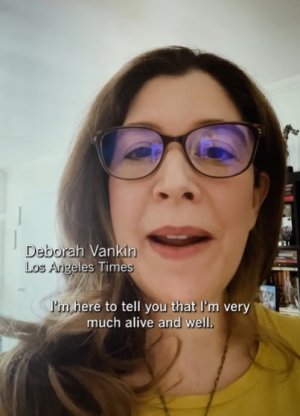Alive but declared ‘dead’: How scammers are exploiting obituaries to dupe you!
- Replies 9
In the digital age, where information travels faster than the blink of an eye, the truth can sometimes become a casualty.
This has been made painfully clear by a disturbing trend that has emerged online.
These are not only shocking and upsetting for the victims, but they also serve as a stark reminder of the dark side of the internet.
Imagine scrolling through your phone only to find an obituary with your name on it, complete with a detailed account of your life and accomplishments, and even morbid images to accompany the text.
This was the reality for Deborah Vankin, a writer who was very much alive and well when she discovered her own 'death' being reported.
The obituaries, which appeared online in January, were a jarring mix of flattering prose and unsettling visuals, including a car wreck and a coffin leaving a funeral home.
However, no alleged cause of death was specified in any of them.
‘Deborah Vankin, an esteemed journalist whose eloquent storytelling and insightful narratives illuminated the world around us, has passed away,’ stated one of the obituaries.

However, Vankin is not alone in this bizarre and unsettling experience.
She is just one of many individuals who have become the unwitting subjects of a new scamming technique that uses AI to generate fake death announcements.
These announcements are designed to attract clicks and generate ad revenue, preying on the natural human instinct to search for information about the deceased.
The scammers behind these ‘obituary pirates’ are sophisticated, using AI to pad their fake announcements with keywords that rank high in Google searches, spreading misinformation and causing alarm.
‘I oddly didn’t panic. I was mostly confused at first, then outraged,’ Vankin recalled.
‘I was sad—reading your own obituary is a surreal experience. After speaking with experts, I was scared—for myself, for all journalists, and for our society.’
The rise of these scams has prompted Google to announce new policies aimed at keeping clickbait obituaries and other low-quality content out of search results.
However, the effectiveness of these measures remains to be seen, as AI technology continues to grow and evolve, making it increasingly challenging to combat such deceptive practices.
Joshua Klopfenstein, Co-founder of Lindenwood Marketing, which provides digital services to funeral homes, noted that while death-related scams have long been prevalent, scammers typically target grieving families by impersonating funeral homes to extract cash.
However, he highlighted a new and more sophisticated trend: clickbait obituaries, exemplified by Vankin's experience, which capitalise on the popularity of low-quality, AI-generated content.
These obituaries are disseminated through websites that publish a constant stream of unrelated articles on various topics, containing minimal information, but packed with keywords to exploit Google searches.
Vankin first learned of her own obituary from her father, who was alerted to it by an aunt receiving Google updates whenever her name surfaces online.
Reflecting on the ordeal in an essay for the Los Angeles Times, Vankin—a journalist for the publication—shared her initial reluctance to engage with obituaries, and how the incident reshaped her perspective on mortality.
Vankin said she was not sure as to why she was chosen by the scammers, but speculated that it might be that the scammers thought they’d benefit because she is a writer with an increasing social media presence.
According to Klopfenstein, scammers find targeting obituaries financially lucrative.
‘These scammers are correct in realising the amount of traffic that obituaries drive,’ he stated.
‘For most funeral home websites, obituaries account for 80 per cent to 85 per cent of all visitors. That said, a scammer needs to pirate a ton of obituaries… to get enough traffic to generate significant ad revenue.’
Recently, numerous questionable obituaries have garnered attention, circulating on social media. These hoaxes often involve fabricated death notices for individuals, including both deceased and living individuals.
Google stated that it continuously enhances its systems to limit spam, and counter the evolving tactics of spammers.
‘With our recent updates to our search spam policies, we’ve significantly reduced the presence of obituary spam in search results,’ a Google spokesperson declared.
‘On YouTube, we fight this content by rigorously enforcing our spam, deceptive practices, and scams policies.’
Google also posted a blog to discuss the changes regarding this issue, saying, ‘They are produced at scale with the primary intent of gaming search ranking, and offer little value to users.’
While Vankin’s unsettling tale happened overseas, similar incidents have happened in Australia.
This alarming phenomenon was further exemplified by the recent case of an ABC journalist, who found himself at the centre of a similar hoax.
The victims’ statements refuting their own deaths serve as a poignant reminder of the consequences of such deceptive practices, and the need for heightened awareness and vigilance in navigating the digital landscape.
 Have you or someone you know ever encountered a scam like this? How do you ensure the information you find online is trustworthy? Share your experiences and tips in the comments below to help others in our community stay safe and informed.
Have you or someone you know ever encountered a scam like this? How do you ensure the information you find online is trustworthy? Share your experiences and tips in the comments below to help others in our community stay safe and informed.
This has been made painfully clear by a disturbing trend that has emerged online.
These are not only shocking and upsetting for the victims, but they also serve as a stark reminder of the dark side of the internet.
Imagine scrolling through your phone only to find an obituary with your name on it, complete with a detailed account of your life and accomplishments, and even morbid images to accompany the text.
This was the reality for Deborah Vankin, a writer who was very much alive and well when she discovered her own 'death' being reported.
The obituaries, which appeared online in January, were a jarring mix of flattering prose and unsettling visuals, including a car wreck and a coffin leaving a funeral home.
However, no alleged cause of death was specified in any of them.
‘Deborah Vankin, an esteemed journalist whose eloquent storytelling and insightful narratives illuminated the world around us, has passed away,’ stated one of the obituaries.

Deborah Vankin refuted reports of her death after discovering her own ‘obituary’ online. Credits: Instagram / Deborah Picker Vankin
However, Vankin is not alone in this bizarre and unsettling experience.
She is just one of many individuals who have become the unwitting subjects of a new scamming technique that uses AI to generate fake death announcements.
These announcements are designed to attract clicks and generate ad revenue, preying on the natural human instinct to search for information about the deceased.
The scammers behind these ‘obituary pirates’ are sophisticated, using AI to pad their fake announcements with keywords that rank high in Google searches, spreading misinformation and causing alarm.
‘I oddly didn’t panic. I was mostly confused at first, then outraged,’ Vankin recalled.
‘I was sad—reading your own obituary is a surreal experience. After speaking with experts, I was scared—for myself, for all journalists, and for our society.’
The rise of these scams has prompted Google to announce new policies aimed at keeping clickbait obituaries and other low-quality content out of search results.
However, the effectiveness of these measures remains to be seen, as AI technology continues to grow and evolve, making it increasingly challenging to combat such deceptive practices.
Joshua Klopfenstein, Co-founder of Lindenwood Marketing, which provides digital services to funeral homes, noted that while death-related scams have long been prevalent, scammers typically target grieving families by impersonating funeral homes to extract cash.
However, he highlighted a new and more sophisticated trend: clickbait obituaries, exemplified by Vankin's experience, which capitalise on the popularity of low-quality, AI-generated content.
These obituaries are disseminated through websites that publish a constant stream of unrelated articles on various topics, containing minimal information, but packed with keywords to exploit Google searches.
Vankin first learned of her own obituary from her father, who was alerted to it by an aunt receiving Google updates whenever her name surfaces online.
Reflecting on the ordeal in an essay for the Los Angeles Times, Vankin—a journalist for the publication—shared her initial reluctance to engage with obituaries, and how the incident reshaped her perspective on mortality.
Vankin said she was not sure as to why she was chosen by the scammers, but speculated that it might be that the scammers thought they’d benefit because she is a writer with an increasing social media presence.
According to Klopfenstein, scammers find targeting obituaries financially lucrative.
‘These scammers are correct in realising the amount of traffic that obituaries drive,’ he stated.
‘For most funeral home websites, obituaries account for 80 per cent to 85 per cent of all visitors. That said, a scammer needs to pirate a ton of obituaries… to get enough traffic to generate significant ad revenue.’
Recently, numerous questionable obituaries have garnered attention, circulating on social media. These hoaxes often involve fabricated death notices for individuals, including both deceased and living individuals.
Google stated that it continuously enhances its systems to limit spam, and counter the evolving tactics of spammers.
‘With our recent updates to our search spam policies, we’ve significantly reduced the presence of obituary spam in search results,’ a Google spokesperson declared.
‘On YouTube, we fight this content by rigorously enforcing our spam, deceptive practices, and scams policies.’
Google also posted a blog to discuss the changes regarding this issue, saying, ‘They are produced at scale with the primary intent of gaming search ranking, and offer little value to users.’
While Vankin’s unsettling tale happened overseas, similar incidents have happened in Australia.
This alarming phenomenon was further exemplified by the recent case of an ABC journalist, who found himself at the centre of a similar hoax.
The victims’ statements refuting their own deaths serve as a poignant reminder of the consequences of such deceptive practices, and the need for heightened awareness and vigilance in navigating the digital landscape.
Key Takeaways
- Scammers are creating fake obituaries using AI to generate clicks and ad revenue, causing distress and misinformation.
- Deborah Vankin, a Los Angeles Times journalist, discovered her own 'obituary' online, leading to a range of emotions, and concerns about the impacts of such scams.
- Google announced policy updates to prevent these clickbait obituaries and similar low-quality spam from appearing in search results.
- The phenomenon of fake obituaries is not only causing emotional distress to those targeted, but also creating challenges for people trying to find accurate information online.








